Updated: January 31, 2025
To provide you with the most accurate and up-to-date cost figures, we gather information from a variety of pricing databases, licensed contractors, and industry experts.
You can customize your shower’s look and feel in many ways, and ceramic tiles are a great option. They come in a wide range of styles, shapes, sizes, and colors to create a unique, custom shower to suit your tastes and needs. Showers come in various sizes and configurations, and when paired with the number of tile options, it means a wide range of costs.
The average range for a fully tiled shower is around $1,800 to $4,000, including the pan and 3 walls. Most homeowners pay about $2,619 for the job when using machine-made tile. This project’s low cost is $794 for installing machine-made wall tile on a 2-wall neo-angle shower with an acrylic base. The high cost is $4,892 for installing handmade wall tile on a 3-wall shower in a mosaic pattern with a mosaic tile floor.
Cost to Install a Ceramic Tile Shower
| Ceramic Shower Tiles Prices | |
| National average cost | $2,619 |
| Average range | $1,800-$4,000 |
| Low-end | $794 |
| High-end | $4,892 |
Ceramic Shower Cost by Tile Construction
Ceramic tile is one of the oldest types of building material. It is a manmade material that consists of two parts - the clay body and glaze. It can be made by hand in many ways or extruded, cut, and glazed by machine, resulting in a range of appearances. Ceramic tiles are different from porcelain and other manmade materials because it is made of wet clay and always has a glaze. There are unglazed clay tiles, but these technically fall under a different heading.
There are two broad categories for ceramic tile. The first is monocottura, meaning once fired. In a monocottura tile, the wet clay dries, hardens, and is given a glaze and fired into its final hard state. Glazed terracotta tile is a good example of a monocottura tile.
The second broad category is known as bicottura, meaning twice fired. Bicottura tiles are extruded or formed from wet clay, allowed to dry, and then fired in a kiln until hard. They are then given a glaze and fired in a kiln again. This two-step process makes the tile more durable. Most ceramic tiles rated for floor use are bicottura. Ceramic tiles made for wall use may be monocottura or bicottura, depending on the manufacturer and tile’s end appearance.
You can break down ceramic tiles into further categories, depending on how they are made, finished, and used. Machine-made tile and handmade overlap in appearance and use. However, it is typically less expensive and more uniform in shape, size, and color than handmade because of how they are formed.


| Type | Costs per Sq.Ft. (Materials Only) |
| Machine-Made | $1.25 - $50 |
| Handmade | $10 - $100 |
Machine-Made
Machine-made tiles average $1.25 to $50 a sq.ft. These are tiles entirely made by a machine. They are even and uniform in color, edge, and appearance. What you see is what you get with these tiles, and there are rarely surprises. They come in sizes ranging from ⅜ inch to 16 inches. Machine-made tiles tend to be thinner than handmade. They are also easier to install because the edges are usually square, and the color or glaze is more uniform. However, they do not come in as many sizes and shapes, so you may be confined to a single size and shape if you find a color or style you like. Handmade tiles may give you many options for both.

Handmade
Handmade tiles tend to cost between $10 and $100 a sq.ft. These tiles are completely formed by hand or extruded by machine and cut and finished by hand. They are more expensive with more color, edging, and texture variation. They need a wider grout joint when installed, but they provide dramatic and beautiful results that cannot be produced from machine-made tiles. Many companies that make handmade tiles offer considerably more choices for color, size, shape, and style than machine-made. Many handmade tiles are made to order, so they take longer to get, but you can also customize them.

Ceramic Tile Shower Cost by Type
Many ceramic tiles are also designated into types and uses. This may include those rated only for wall usage, those rated for floor use, and those designated by size, such as large format and mosaic. Any of these tiles can be used in the shower, particularly on the walls. However, they produce different looks and installation concerns. The costs below show material prices for the various types of tile.
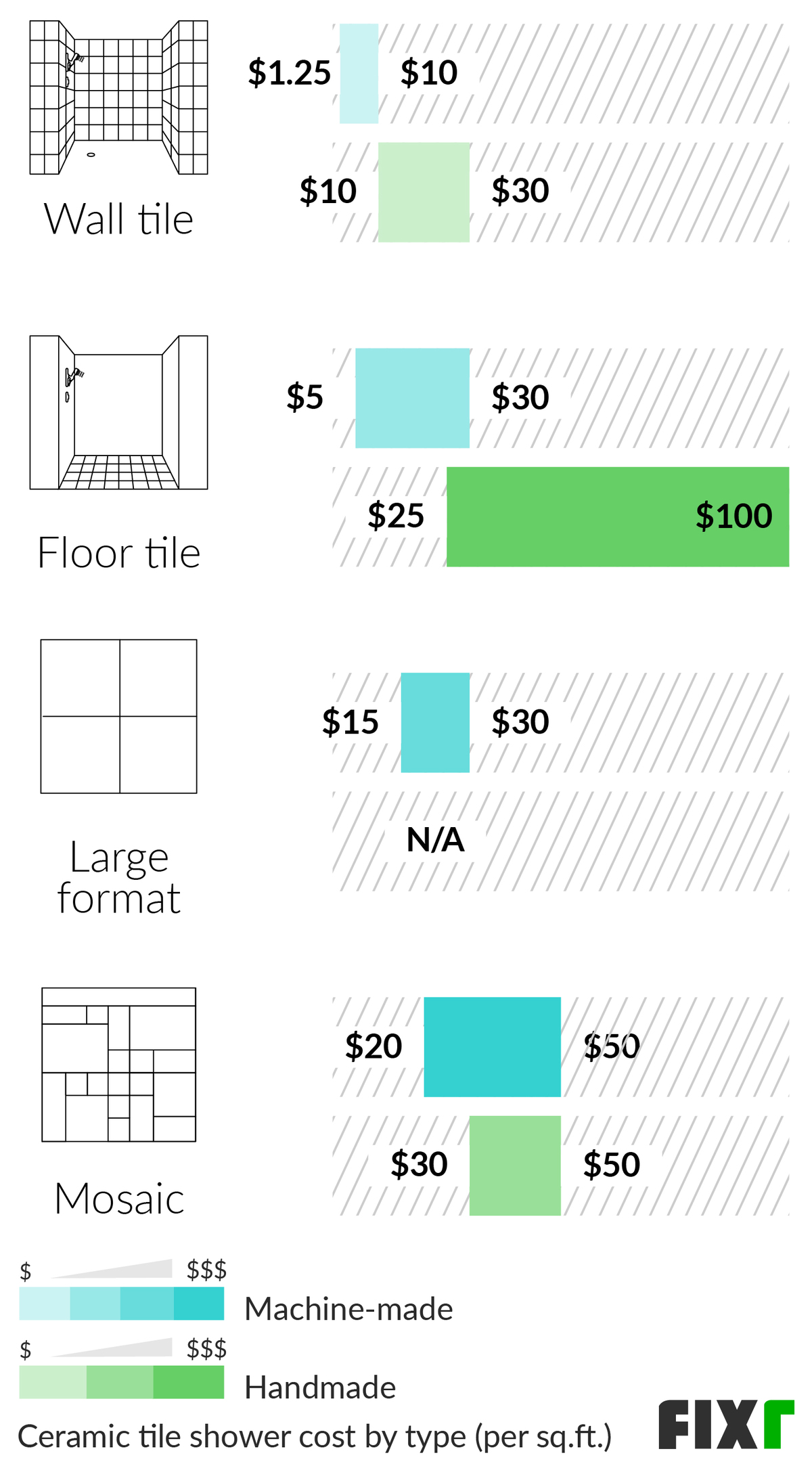

| Type | Costs per Sq.Ft. (Machine-Made) | Costs per Sq.Ft. (Handmade) |
| Wall | $1.25 - $10 | $10 - $30 |
| Floor | $5 - $30 | $25 - $100 |
| Large Format | $15 - $30 | N/A |
| Mosaic | $20 - $50 | $30 - $50 |
Wall Tile
The cost of machine-made ceramic wall tile is $1.25 to $10 a sq.ft. Handmade wall tile costs $10 to $30 a sq.ft. Wall tile is designed for use only on walls. It likely has a glossy glaze finish, but some companies produce matte-finish wall tiles. They come in sizes from mosaic to around 8” x 8”, with 4” x 4” and 3” x 6” being the most common. Wall tile tends to be thinner and more fragile than tile rated for floor use. Any tile can be installed on the walls, including those designed for the floor. However, tile rated only for wall use cannot be used on the floor.
Floor Tile
Machine-made ceramic floor tile averages $5 to $30 a sq.ft. Handmade tile costs between $25 and $100 a sq.ft. Floor tile is a thicker, more durable tile with a glaze that withstands traffic without chipping. While you cannot install a wall tile on the floor, you can install a floor tile on the wall. Floor tiles commonly come in 2”, 6”, 12”, and larger sizes. Some handmade tiles come in more sizes. Floor tile may be textured or have a flat matte finish. Some handmade floor tiles may have a glossy finish, but this is rare.
Large Format
Large format ceramic tiles cost $15 to $30 a sq.ft. While not as common as porcelain, large format ceramic tile exists. They are only available machine-made. To qualify as large format, the tiles must be 16” or greater. When installing them on the walls, additional care must be taken to keep the installation level. Large format tiles tend to “lip” or have corners that stick out farther than the rest of the installation, making cleaning more difficult.
Mosaic Shower Tiles
Machine-made mosaic tiles cost between $20 and $50 a sq.ft. Handmade averages $30 to $50 a sq.ft. A mosaic tile is any tile measuring 2” or smaller. They are sold in sheets held with mesh on the back or contact paper on the front. Mosaics are typically more expensive than larger tiles. If you plan to tile your shower floor, you need to use mosaics because they slope to the drain. However, you can also use mosaics on the walls to accent or cover the entire surface. Mosaic makes an excellent accent and can be used as borders because you can easily cut the sheets into rows.
Ceramic Shower Tiles Cost by Finish
All ceramic tiles are given a glaze on the surface. However, this glaze can take on many appearances, depending on the materials. This glaze can be flat and matte, highly reflective and glossy, metallic, or crackled. Each glaze and finish for the tile may impact looks, costs, and performance. Costs below show the price for the materials of each finish.


| Type of Finish | Costs per Sq.Ft. (Machine-Made) | Costs per Sq.Ft. (Handmade) |
| Glossy | $1.25 - $10 | $10 - $50 |
| Crazed | $3 - $15 | $15 - $50 |
| Matte | $3 - $15 | $15 - $50 |
| Metallic | $10 - $30 | $30 - $50 |
| Inlaid | N/A | $50 - $100 |
Glossy Glazed
Glossy glazed ceramic tiles cost $1.25 to $10 a sq.ft. for machine-made tile. Handmade tiles average $10 to $50 a sq.ft. Glossy tile has a reflective finish and smooth surface. This is the classic-looking wall tile most people have seen in the past. It comes in a range of solid colors from white to black and everything in between. These may have straight edges, beveled sides, or a more uneven handmade edge. They also come in sizes up to 12” from many manufacturers.
Crazed/Crackle
The cost of a crazed or crackled ceramic tile is $3 to $15 a sq.ft. for machine-made. The cost of a handmade tile ranges from $15 to $50 a sq.ft. A tile that has a crazed or crackle finish has a glaze with cracks. Any ceramic tile may craze at any time, but this is not a defect. Exposure to heat and cold causes glaze to craze. Some tiles are given a glaze that crazes on purpose for the look and effect. If you use a tile with a crazed finish, it must be sealed with an impregnating sealer to prevent staining. This is done before grouting and should be reapplied yearly.
Matte-Glazed
The cost of matte ceramic tiles averages $3 to $15 a sq.ft. for machine-made tile. The cost of handmade matte tiles is $15 to $50 a sq.ft. Matte tiles have a flat finish. Most floor tiles have a matte finish, but many wall tiles can also have a matte finish. The tiles may be a solid color or more varied in color. Matte tiles do not show water spots as easily as glossy tiles, so they can be a good choice in areas with hard water.
Metallic
The cost of machine-made metallic glazed ceramic tile ranges from $10 to $30 a sq.ft. Handmade tile is $30 to $50 a sq.ft. Not all metallic glazed tiles do well in a shower. Many are made with actual metals in the glaze. Some react poorly with the soaps, shampoos, and other personal hygiene items, depending on the metal. The finish may discolor if this occurs. If you choose metallic tiles, look for non-reactive tiles to avoid problems.
Inlaid
Inlaid ceramic tile costs $50 to $100 a sq.ft. Inlaid tile is completely handmade. It is made by carving away sections of the base tile. The base tile is usually a neutral color, such as white, cream, or tan. Colorful clay fills the carved sections to stand out against the background. The entire tile is usually given a clear glaze to seal it. The colors used for the inlay are usually limited to a few shades like red, green, and blue. The clay must be dyed for the color, and many colors may not show well after firing, limiting those that can be used.
Ceramic Tile Patterns
Ceramic tiles come in many shapes and sizes, including squares, rectangles, circles, diamonds, and freeform shapes. Each can be installed singularly or in combination with another, and each can often be installed in different patterns. Popular patterns include:
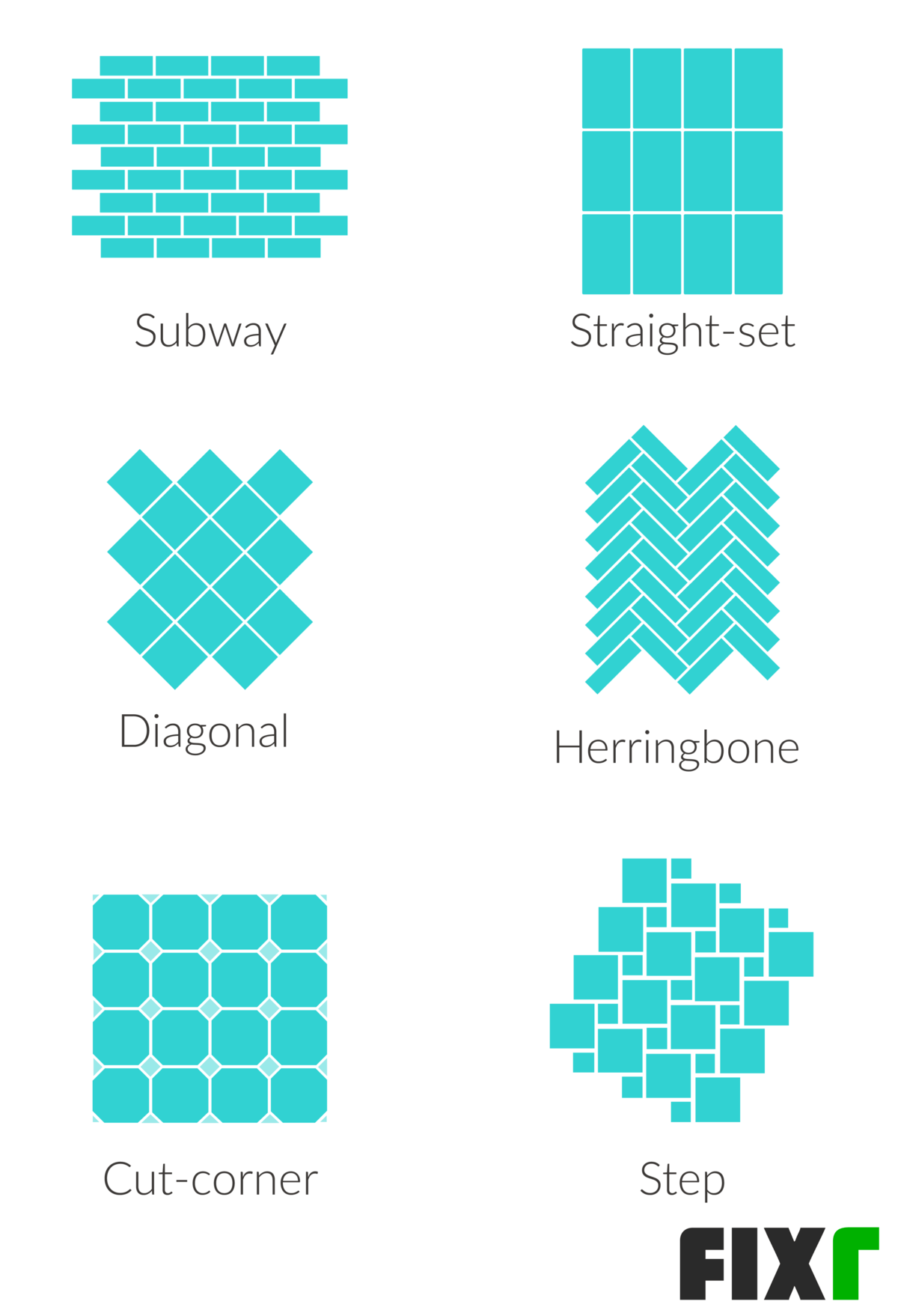

- Subway (running bond)
- Straight-set
- Diagonal
- Herringbone
- Cut-corner
- Step
Any design beyond a straight-set or running bond increases your installation costs. This is because most patterns require more tiles to be cut to fill the perimeter. You must purchase approximately 15% to 20% more material for the job, and your installer spends more time laying and cutting the tiles, meaning they could increase labor costs by $1 to $2 per sq.ft. Expect your total costs to be roughly 20% to 25% higher than using a simple pattern.
Labor Cost to Install a Ceramic Tile Shower
Tile installers charge for labor in several ways. They can charge by the job, the square foot, or the hour for complicated jobs. Most tile installations are calculated by the square foot. Installers typically charge between $3 and $10 per sq.ft., depending on how complicated the pattern is. For a standard shower, expect the labor cost to total between $288 and $960 for most straightforward installations.

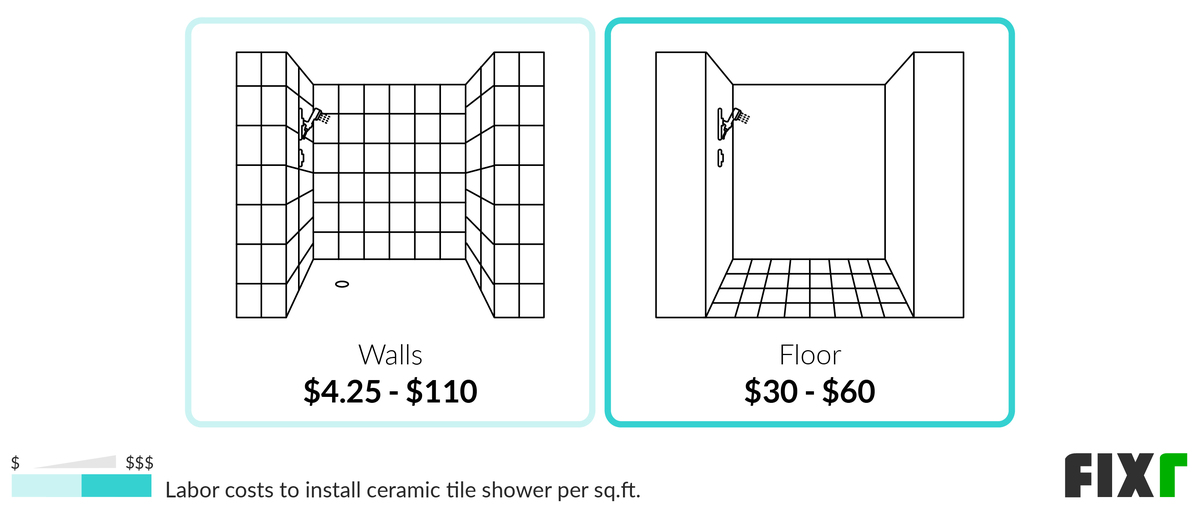
| Shower Area | Average Costs per Sq.Ft. (Installed) |
| Walls | $4.25 - $110 |
| Floor | $30 - $60 |
Install a Ceramic Wall Tile
The shower walls are the biggest part of a tile shower installation. This is true whether you are tiling the floor or only the walls. In most cases, installation is simple. You start in the bottom center of the main wall and move outward and upward evenly. The only obstacles involve cutting the tiles to fit around the plumbing and niches in your shower you want tiled.
The shower walls take longer to tile than the floor because the walls are larger and often have more involved patterns. When a pattern is installed on the walls, you may find that the labor cost is higher than the floor area.
The average cost range to install ceramic wall tile in the shower is $4.25 to $110 a sq.ft. Handmade and mosaic tile cost more to install per square foot than machine-made tile of average size.
Ceramic Tile Shower Floor
Ceramic tile shower floors are usually a quick-and-easy install using mosaic tiles to conform to the drain’s slope. Cutting and installing mosaics is a simple process because the sheets can easily be trimmed. Individual tiles can be cut on a tile saw or with nippers.
The average cost range to install ceramic tile on a shower floor is $30 to $60 a sq.ft., including labor and material. This is the smallest part of the installation, with the average shower only requiring about 16 square feet of material.
Cost to Replace Ceramic Tile
If you change the plumbing in your shower, a tile breaks, or need to remove some tiles to access the wall behind it, you may need to replace some tiles or the entire shower. When only replacing a few tiles, expect costs of between $200 and $500 for most small jobs. This is due to the labor involved because the tile must be cut free, the old mortar removed, cleaned, and the new tile installed. Matching an existing tile is also extremely difficult and may require custom color matching by sending a sample to an specialized company. This can take weeks for older tiles.
Keep at least a few extra tiles on hand for future repairs to avoid this. This reduces costs when replacing tiles from damage or plumbing-related issues.
When replacing all the tile in your shower, expect to pay between $1 and $2 a sq.ft. in labor to remove the old tiles and ready the shower to accept the new ones. From here, your costs are similar to the cost of installing new tiles, $4.25 to $110 a sq.ft. This makes the cost range to replace ceramic tiles in a full shower between $5.25 and $112 a sq.ft.
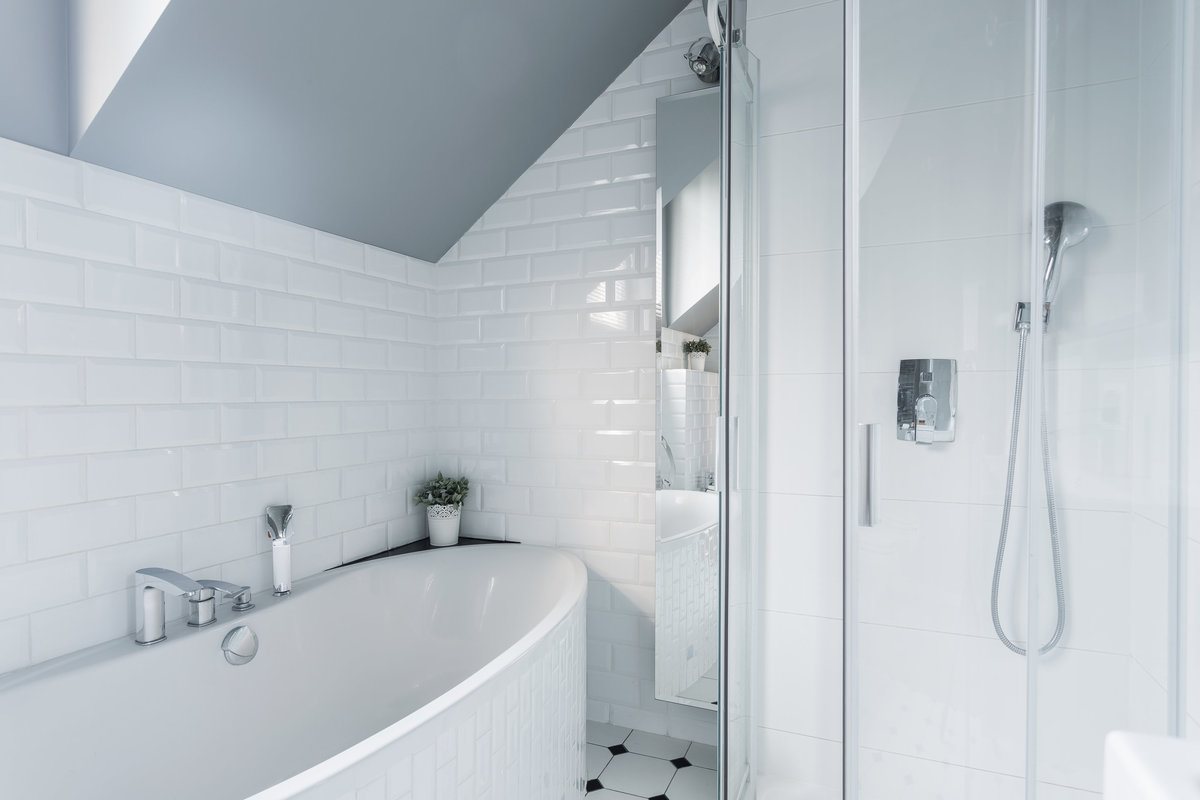
Cost to Replace a Shower Stall with Tile
If you have an existing acrylic or fiberglass shower stall, you can remove and replace it with tile to give your bathroom a fresh look. The average cost to tear out an old shower stall ranges from $100 to $300. From there, the stall must be prepped with a new backer board to accept the new tile, which costs a further $200 to $300. At this point, the stall can be tiled with your tile choice at $4.25 to $110 a sq.ft.
When replacing the walls with tile, you can use a readymade acrylic shower pan for the floor or create a tile floor. It is often less expensive to use a readymade pan than to tile the floor, depending on the stall size.
Pros and Cons of Ceramic Tile
Ceramic tile is an incredibly versatile material that comes in a nearly endless array of colors, styles, sizes, and shapes. This provides many ways to customize your shower, going for a colorful and varied installation for a child’s bathroom or having a more traditional look for a master bath. They have certain attributes making them a better or worse fit for many jobs. Most of them are very low-maintenance. The glaze on the surface is non-porous, so the tile does not require sealing or special cleaners.
Ceramic tile glaze can craze or crack at any time, even with a matte finish glaze. You risk staining when this happens, so ensure it is sealed. If your tile is in a steam shower, crazing or cracking of the glaze likely means more staining if the tile is not sealed regularly.
Ceramic tile can be brittle, so a shower curtain rod suddenly coming free and knocking a tile could produce a chip. If the glaze chips away, the clay body is visible. Depending on the tile type, the grout joint could be from 1/16” to ¼”. These grout joints should be sealed to prevent staining. Alternatively, you can use pre-sealed or epoxy grouts to prevent staining or opt for a darker color grout.
Handmade tiles also have a wider grout than machine-made from the uneven edging. Handmade tile is more likely to have color variation between the tiles, even within one lot. However, even machine-made tiles have different dye lots, resulting in varying shades. To help prevent this, always purchase from one lot and purchase more than you need.

Ceramic vs Porcelain Tiles for a Shower
Both ceramic and porcelain tiles make excellent materials for showers. The biggest differences in this part of the home are style and appearance.
Ceramic tile is made from wet clay that is fired and given a glaze. It comes in a nearly endless stream of colors with many shapes and sizes.
Porcelain tile is made from compressed clay dust that has been fired to very high temperatures. While it can be glazed, it does not have to be. It can appear like stone, wood, fabric, and metal. It tends to be larger, from around 12” square to 36” square.
Porcelain is often more difficult to cut, and the larger tiles are more time-consuming to install to prevent issues like lippage. If you opt for a large format porcelain tile in your shower, expect installation costs to rise to $14 to $16 a sq.ft. for the labor. While a 12” ceramic tile and 12” porcelain tile have similar costs, a 4” wall ceramic tile is cheaper to purchase and install than a 4” porcelain tile.
From a maintenance standpoint, both are similarly low-maintenance. Because porcelain is not usually glazed, it cannot craze and never needs sealing. Ceramic tiles may craze and require sealing.
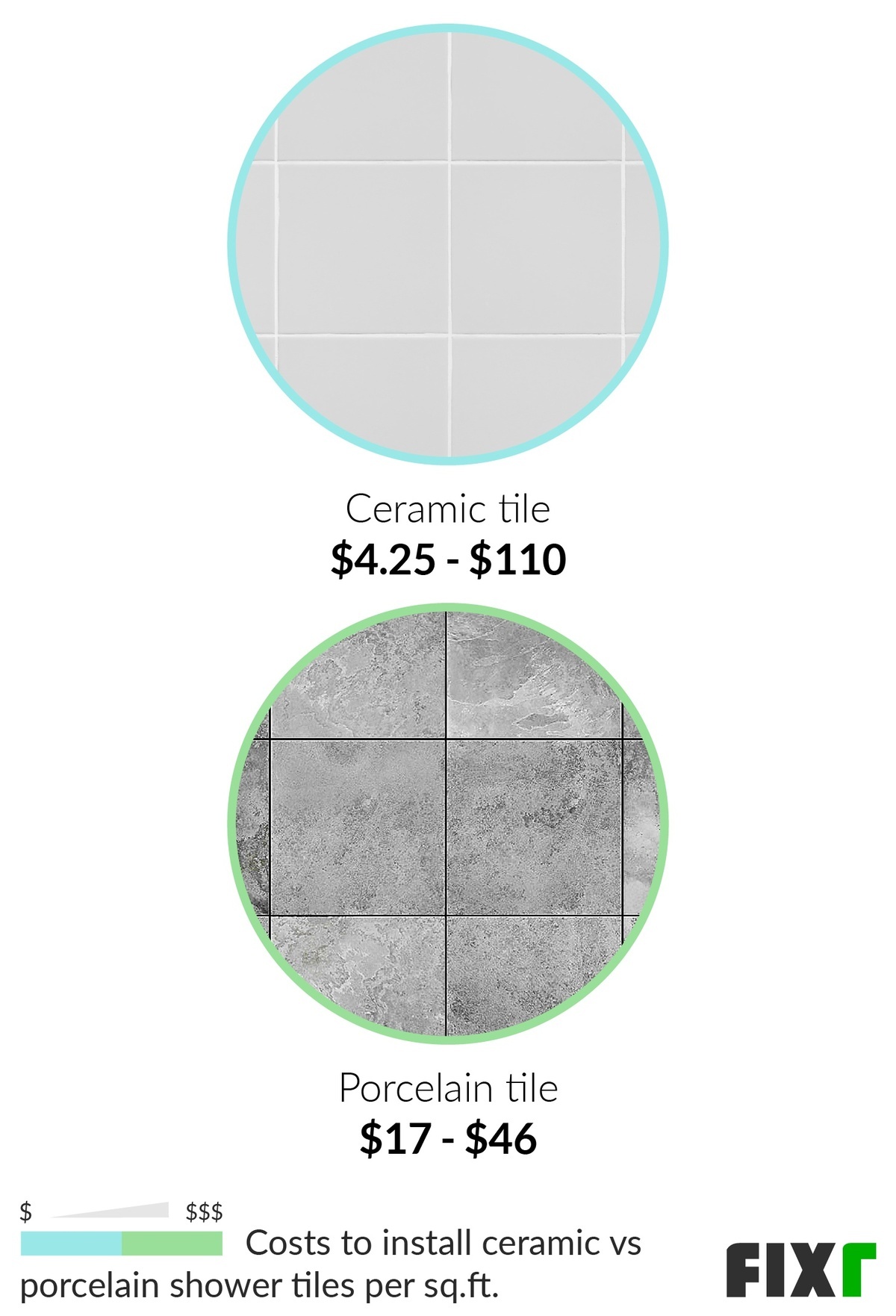

| Material | Average Costs per Sq.Ft. (Installed) |
| Ceramic Tile | $4.25 - $110 |
| Porcelain Tile | $17 - $46 |
Enhancement and Improvement Costs
Remove Old Tiles
When completely replacing your shower, you must remove the old tile first. This is a fairly easy-and-straightforward job if all the tiles are removed, requiring a chisel, hammer, and pry bar. Expect starting costs of around $1 to $2 a sq.ft. for the removal. You can do this part of the job yourself, but remember to put down plastic to catch the debris.
Waterproofing Membrane
Always have a waterproofing membrane installed over your studs before putting up the backer board the tile is installed on. This prevents moisture issues from developing later. The cost of the membrane starts at around $10 a roll.
Grab Bars
Grab bars are a common addition to many showers. They can assist users in getting safely in and out of the shower without worrying about falls. Grab bars should be braced behind the wall before tiling the shower to ensure the proper support. The average grab bar installation costs between $85 and $300. While bathroom accessories such as towel holders can be installed by the homeowner, grab bars require professional installation whenever possible. This is due to the fact that the bar must support the weight of the person using it, not only to assist in movement, but in the event of a fall.
Additional Considerations and Costs
- Shower configuration. The way your shower is laid out may impact costs. Tile niches, seats, and different plumbing types, such as jets, can increase the project cost. Having a tub/shower eliminates the need for the floor, but you must tile over the tub flange, increasing costs.
- Discounts. Some installers may offer a discount per square foot on labor if the shower is tiled with the floor or a countertop. Speak to your installer about what may be available.
- Purchase. You may be able to save money by purchasing the tile directly. This eliminates additional contractor fees and may save roughly 10% or more on material costs.
- Waterproofing membrane. While ceramic tile is waterproof, you need to install a waterproofing membrane over the studs before installing the backer board. This protects your studs from potential water damage or mold in a leak.
- Cleaning. Ceramic tile is very easy to keep clean. You can use your favorite shower cleaner as needed. To help eliminate water spots, you can also squeegee your walls after use.
- Plumbing. When tiling a shower, it is also a great time to update your plumbing because the walls are open. Plan for plumbing updates ahead of time in case this impacts the tile layout.
FAQs
- What is the best way to clean a ceramic tile shower?
Use a squeegee after you shower to prevent soap scum build-up. Otherwise, clean your shower with your favorite bathroom cleaner. Ceramic can be cleaned with anything unless you have green-glazed tile that contains copper in the glaze or a metallic-glazed one. In this case, use a pH-neutral cleaner.
- How much does it cost to tile a shower stall?
The average cost range to tile a shower stall is $1,800 to $4,000 when using ceramic tile. Costs may be higher or lower when using other materials.
- Does ceramic tile need to be sealed?
No, ceramic tile does not need to be sealed if the glaze has no surface cracks. If the glaze cracks at any time, it should be sealed to prevent staining.
- Is ceramic tile suitable for shower walls?
Ceramic tile is perfect for shower walls. When choosing a crazed tile or tile with a crackled finish, remember to seal it yearly to impede staining.
- Are ceramic tiles good for showers?
Ceramic tiles are perfect for showers. They hold up well to water, but seal it yearly to impede staining if you have a crazed tile or tile with a crackle finish.
